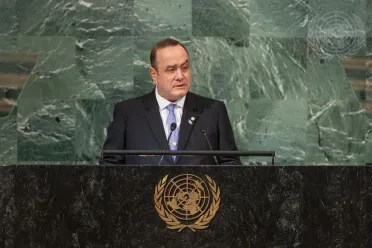Statement
Statement summary
ALEJANDRO GIAMMATTEI FALLA, President of Guatemala, recalling that war led to the establishment of the United Nations and a belief that “peace was going to be there forever”, said that nations have “woken up from this dream to find ourselves in a wounded, contaminated and contradicted world”. Therefore, the international community must raise its voice to discuss and to build, once again. Turning to climate change, he said that this phenomenon has caused damage to his country totalling more than $6 billion and that the “industrial world has not responded with answers to the problems it has caused”. To address this problem, Guatemala has worked to rebuild public infrastructure, recover agricultural production and establish forestry reserves. In the last two-and-a-half years, almost 15,000 hectares of protected forests have been established, which facilitate local economic development and serve as a barrier to climate change.
He went on to highlight Government efforts to assist small farmers with their harvests, noting that such efforts have helped 50,000 farmers so far — and will help thousands more — mitigate the impact of climate change. Guatemala is also promoting a national decarbonization policy, strategies to reduce the effects of fossil-fuel vehicles in the medium-term and incentives for electric vehicles. By 2032, Guatemala will produce more than 80 per cent of its energy from renewable sources. He spotlighted, however, an increasing crisis in food security and nutrition, which is threatening famine amidst the “indolence of other countries that are taking more in the face of those countries that have less”.
Turning to migration, he said that, while this phenomenon has multiple causes, economic drivers and climate change are among the principal factors. To address this issue, Guatemala has worked on structural solutions, which is the only way to enable sustainable migration. The Government has also enabled an appropriate legal framework to address the population’s basic needs. Noting that illegal trafficking in migrants has become an issue of transnational security, he said that his country — as one of origin, transit and destination — ensures that such individuals’ human rights are protected. Solutions to transnational and international threats can be found if the global community works together and — spotlighting the issue of drug trafficking — he appealed to consumer countries to break down the structures that fuel this illicit trade.
He went on to stress that, regardless of their size, relations between countries must be based on respect, that no State can interfere in the internal affairs of another and that global crises result from overlooking sovereignty. He also highlighted several current challenges not seen since the Second World War: harmful levels of hate speech, discrimination against migrants, rejecting democracy as a system and widespread violations of human rights. Joining the global call to end the war in Ukraine — along with threats to the stability of Taiwan and Israel — he stressed that “peace is not a lack of war”. Rather, a renewed United Nations must create global conditions conducive to the holistic development and wellbeing of all peoples.
Underscoring the urgent need to recall the purposes that led to the birth of the United Nations — “to preserve future generations from the scourge of war” — he called for the Organization to be transformed to ensure that more tools and resources are available with which to overcome global challenges. In this vein, profound changes to the Security Council are urgently needed, he stressed, and the 15-member organ must uphold its responsibility without ideological bias so that no country can veto resolutions unless it “authentically seeks to protect peace”. “Hunger and poverty have no ideology,” he added, urging the international community to focus on comprehensive, holistic development. He also stated that Guatemala stands ready to foster international cooperation that ensures Taiwan’s right to belong to the United Nations and to be recognized as a nation — rights currently denied by one of the permanent members of the Security Council.
Full statement
Read the full statement, in PDF format.
Photo

Previous sessions
Access the statements from previous sessions.
